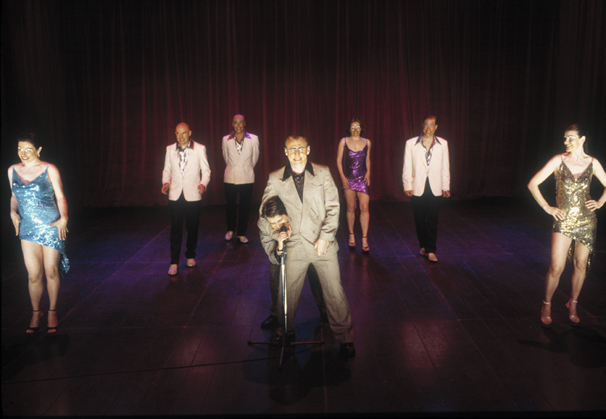In London all next week with Forced Entertainment at Artsadmin’s Toynbee Studios in the East End, presenting two performances from the back-catalogue. Its pretty fascinating to be going back to these, and a rare chance to catch them again (or for the first time) if anyone’s in London. Do come and see.
End of the week is First Night (2001) – a kind of vaudeville gone-wrong, all rigid smiles, failed magic and sequins. Its on the very dark side of funny I guess – a nice reminder of the place we were in before the relatively easy-going attitude of shows like Bloody Mess (2004) and The World In Pictures (2006). Start of the week goes even further back in time to Dirty Work (1998) which is very stripped-down minimal, almost virtual theatre or cinema even, at least in the sense that nothing happens as such, everything is described/summoned in language. I guess this piece has a close relation to some of the things that I’ve been working with in video – especially the piece Starfucker in which white text titles appear in sequence on a black screen, each line an image involving some Hollywood star in the midst of some unexpected or inexplicable event or scenario.
Tom Cruise on an operating table.
David Soul in drag.
Michelle Pffiefer with her foot raised, just about to place it on a step.
You can read the short programme note I wrote for the re-presentations of First Night and Dirty Work below.
Performance 10 June starts at 8pm.
Toynbee Studios, London. 020 7650 2350
A note on First Night and Dirty Work: June 2007
Think about it this way: inside the theatre there are only the performers and the audience. Onstage the performers have some material items – flimsy or not-so-flimsy scenery, various props and costume stuff. The audience, for their part, have their coats, their handbags and the contents of their pockets. But that’s all. The whole of the rest of the world ¬– its physical locations and landscapes, its entire population, its complete set of objects and its unfolding events – is invariably outside, emphatically absent. Theatre then must always be a way of making presence in the context of absence; a process of bringing in the world.
*
The two pieces we’re returning to, to present at Toynbee in this season, each come at the theatrical situation in quite different ways. The melodramatic tones of Dirty Work, with its trio of performers on an empty stage and its hint of music hall and bombast, contrasts sharply with what we always called the disastrous vaudeville of First Night, a performance in which the theatrical is pursued in a far more maximalist incarnation, via a line of performers with fixed grins washed up before us from some song-and-dance show.
In Dirty Work the two speakers approach the job of theatre through a bold, assertive act of summoning, assailing the bare stage with a text that pulls in as much as of the outside world as it can, always eager to find a new act, gimmick or show-stopping event with which to entertain, confront and challenge its audience. Sketched in language alone, the performance shifts from theatrical spectacle to absurdist cabaret and includes, amongst many other things, fragmentary magic acts, scenes of murder mystery, Shakespeare and science fiction as well as mundane events drawn from daily life. At once a competition and a collaboration between the performers who each strive to make something happen using words, the performance is always fragile, an act of will and a determined attempt to draw something from nothing. As audience our presence and indeed our complicity in what takes place is essential, invited as we are to imagine all that is said, our minds constantly co-opted as a screen for the acts, scenes and events that are only described.
First Night for its part is focused less on the creative limits of the theatre act than on the dark double-bind between performers and audience, who are shown in this later work caught in a circle of mutual need, fear, laughter and incomprehension that soon spirals to make a fully-fledged black comedy of failure. The audience, for the hapless entertainers of First Night, are as much the start of a problem as they are a community of potential friends. The theatre’s distance from what we think of as the real world – whose absence is masked by only the thinnest veneer of patter and dances – becomes here a source of rich anger and absurdity. The masks of those onstage slip constantly, the fixed showbiz grins no more sustainable, plausible or human than the mugging of warmongering politicians at a badly staged photocall. The show goes on though (as the world does outside) and as it does so the end-of-the-pier dream of a theatre that might help us forget all our troubles and woes falls to pieces before us, like a car crash of sequins and greasepaint in slow motion.
We’re delighted to get the chance to re-present these pieces. If they each draw attention to problems in the theatrical economy, it’s not just, or not only for the sake of our interest in theatre itself. Instead for us the things that we approach through both Dirty Work and First Night – the role of the viewer in making meaning, the economy of expectations and the negotiation of rules on and off the stage, the temporary formation of community that happens in context of any live performance and of course the always-troubled play between reality and spectacle – are things that speak to the heart of the world we live in, to an understanding of what it is to live now, and to the possibilities of change.
TE, Sheffield, 2007.
